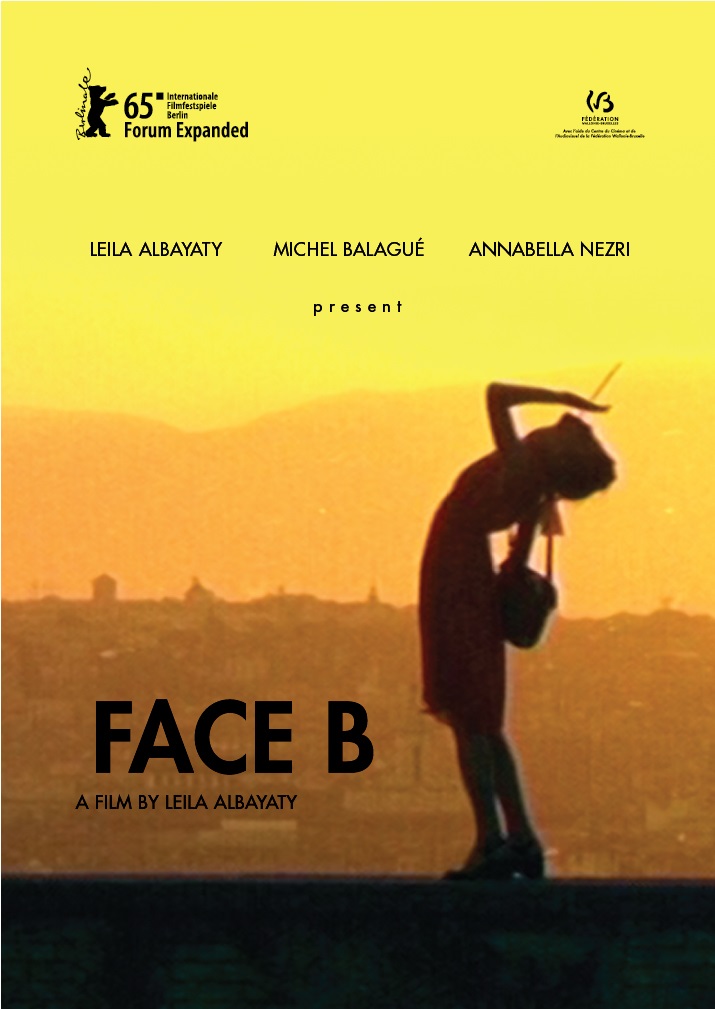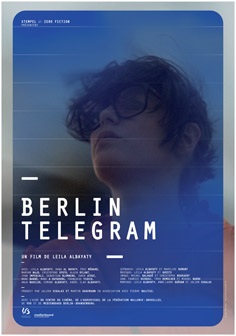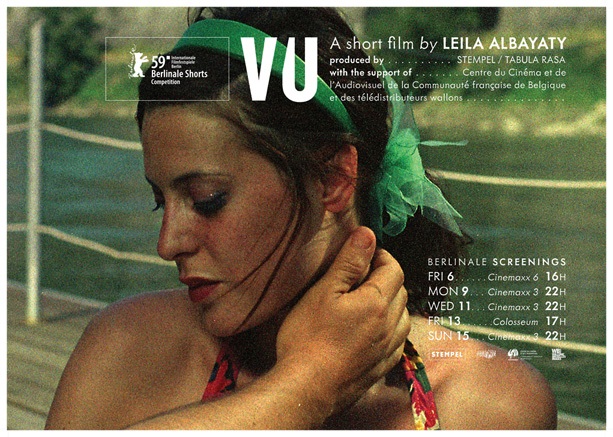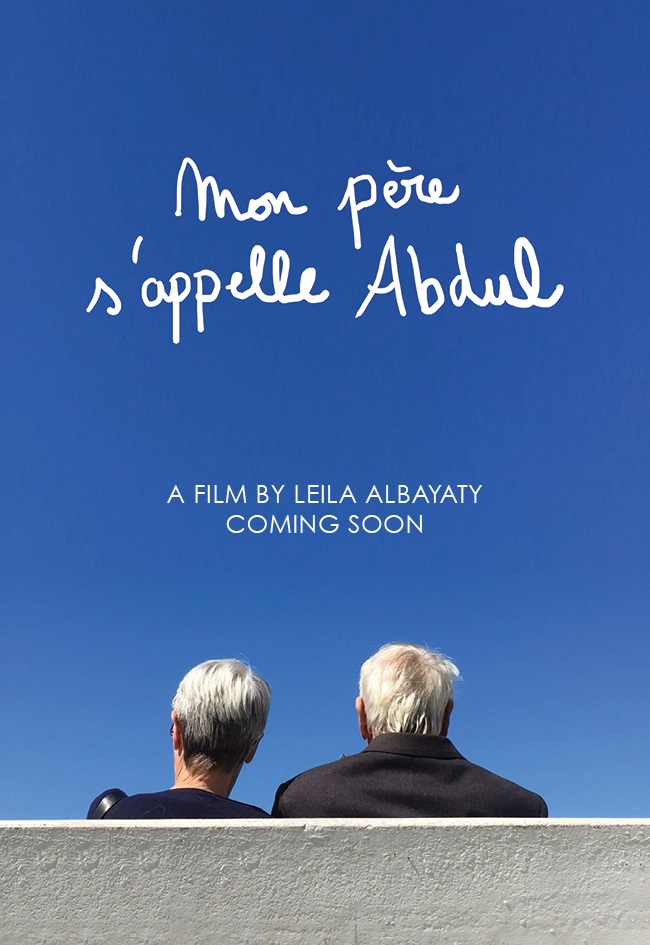🤭 VU : Mention spéciale du Jury, Berlinale, 2009.
Selections: : Berlinale 2009 (Germany) - Indielisboa (Portugal) - Molodist (Ukraine) - Palich (Serbia)
🤭 Berlin Telegram : Prix TV5 : Meillleur film francophone Tous Ecrans, Genève. Prix Meilleure Cinématographie Achtung Berlin.
Selections: Festival of Dubaï in Arabic competition (Dubaï) Opening in the Goethe Institut in Cairo (Egypt) Gulf Film festival (Dubaï) Arabic Film Festival in Rotterdam (Holland) Festival de films d’auteurs de Rabat (Morocco) World Premiere in Mons (Belgium) Indielisbao (Lison- Portugal) Women Films (Chainai-Inde) Tübingen (Allemagne) Cinémania (Quebec) Mar del Plata (Argentina) Festival le 7ème Continent (Paris) Achtung Berlin (Germany) Festival Alfilm (Berlin) Festival de Rabat (Maroc)
🤭 Face B: Selection: 2015 Berlinale Forum expanded (Germany)
Mexico Distrital 2016 (Mexico) - 2016 Berlin Art Film Festival (Germany) - 2016 Créteil Women's Film Festival (France). Distributed by Arsenal.
RFI, avril 2014 / Par Siegfried Forster
« Les traces qui défilent sauvagement à l’écran, c’est sa nouvelle vie qui est en train de prendre forme. Les images vacillent comme les sentiments qu’elles expriment. Leila Albayaty tient la caméra comme on conduit cheveux au vent. Le tout est rythmé par la musique qu’elle compose et interprète elle-même. « Tous les jours, je me lève et joue la musique. Cela me sauve ». Filmé avec beaucoup de délicatesse et précision (chaque dialogue du scénario a été écrit), elle nous offre à travers de sa voix sublime une traversée de sa nouvelle existence. C’est ainsi que, toute à la fin et en filigrane, Leila Albayaty réussit d’entremêler et démêler ses différentes vies et ses origines. »
Reorient , 2013, By Joobin Bekhrad
Flustered, her eyes welled with tears and mascara streaming down her ruddy cheeks, a broken songstress dejectedly moans into a microphone clutched in her sweaty palms in the dank basement of a seedy Brussels nightclub. When do I see you, when do I meet you, when do I hug you, where are you – I need you, she sings. For the dazed audience members washing their insides with lager and puffing away indifferently on their cigarettes, this is just another shoddy spectacle by a half-baked band. For Leila, however, it’s a desperate cry for help – a raw, electrically-charged lament for sweet nothings, broken promises, and illusory embraces. As her ragtag outfit plays on, the broken belle retires from the stage to a lifeless, empty flat. ‘You told me to go. I’m going now. I’m leaving you with the carnage. One day you’ll see my footage, and you’ll look back on your life’,she mumbles wistfully into her camcorder. Heartbroken and with little to lose, Leila, along with her hipster taxi driver-cum-chauffer Eric leaves her bitter memories in Brussels behind for a fresh start in Berlin. Ah, Berlin – Brussels’ raunchier, sleazier cousin, a haven for coked-out drag queens, avant-garde artists, and revolutionaries – the perfect place to smoke away dark memories of unrequited love. Soon after settling in the city with the help of her sister Hana and her brother Tarek from Cairo, the crestfallen Iraqi singer buys a keyboard from Maryam, a hardnosed Iranian artist, and once again resumes her musical excursion. With fresh, biting wounds, Leila has all but healed, and just a few inches shy of tumbling into full-fledged depression, she vividly recounts her days with her philandering ex-lover, Antoine, striving to pinpoint where it all went wrong. It’s not too long, however, before she and Eric befriend Michel, a cordial and charmingly sleazy wannabe rocker, with whom she puts together an indie outfit and slowly patches up a broken heart through the redemptive power of song. We were in a small café / You could hear the guitars play / It was very nice / It was paradise, sang a nostalgic Lou Reed in his haunting 1972 homage to Berlin.
tringing together the episodes the film’s pensive rock and roll heroine are Albayaty’s wistful, melancholic sounds and visuals, which combine for a dreamlike and almost ethereal intensity. Lush, lucid guitar tones accompanied by a pastel palette of dreamy hues and tints effectively capture the mood and sentiment of a downcast lover in an alien environ carrying nothing but emotional baggage and a battered old Telecaster guitar. What makes the poignancy and biting realism of the film even more noteworthy, however, is the fact that not only did Albayaty direct the film (her first effort, in fact), but also played the lead role and composed the film’s soundtrack – a formidable effort indeed, well worthy of representing Iraq at this year’s Dubai International Film Festival, albeit not officially. In the end, Antoine never does get to see Leila’s pitiful video, and the two are never reconciled. However, throughout her journeys, which take her not only to Berlin, but her ancestral Cairo as well, Leila discovers something much greater instead. At the beginning of the seemingly autobiographical film, Leila appears as a broken-hearted girl, dependent on a man – who may well be the only significant person in her life – for her happiness and wellbeing. However, after befriending Maryam and Michel, reuniting with her family in Cairo, and meeting Robert – a newfound bearded lover with a story more tragic than hers – Leila not only finds love, but also true friendship, in addition to realising the importance of family. As well, as she makes it big with her band in Berlin, one witnesses Leila’s transformation from a despondent youth into a self-made, independent woman. On arriving from her serene sojourn in Cairo, a radiant Leila finds herself not as a stranger in a strange land, but rather as a sexy young femme fatale with a new lover on her arm, a killer rock outfit, and a new understanding of camaraderie. For now, everything is going to be OK [stop] C’est beau la vie [stop].
Le Septième Continent, avril 2013 / Par Serge Abiaad
La nostalgie s’installe lorsque le présent n’est plus à la hauteur du passé. Ce sentiment aliénant d’un temps révolu et regretté est la cheville ouvrière de Berlin Telegram, un film exutoire, une expérimentation thérapeutique, une aventure « lyrico-touristique ».
Berlin Telegram, un film qui vogue à travers les rues et la parole, la musique et les lamentations, l’ostracisme et l’altérité, se transposant en une quête salvatrice et rédemptrice. La caméra donne du courage. Elle est du moins prétexte à entrer en conversation et à s’attacher. Leila réussit le pari de se filmer, de raconter son histoire, de communiquer sa peine sans toutefois invoquer la communion empathique. Et pourtant, filmer c’est observer : dès lors qu’on est le sujet de son propre film, l’immersion qui consiste à saisir les modes de fonctionnements des lieux et des évènements est complexifiée par une mise en scène doublée d’une mise en abîme. Leila Albayaty filme ses états, ses écarts, ses éclats, évoqués par ses regards accablés, ses crises de nerfs, son falsetto désarmant, son agnosticisme naissant et surtout par ses larmes, un déluge de larmes. Slavoj Zizek évoque dans un texte sur Kieslowski, ce qu’il désigne comme « l’effroi des larmes réelles », mettant en cause le droit d’intervenir et de filmer à vif ou en catimini une émotion réelle. Le cinéaste polonais décide à la suite de plusieurs essais documentaires, d’approcher le domaine de l’intime et de l’intimité via la fiction, évitant ainsi les écueils éthiques. Leila Albayaty traduit le réel de son expérience subjective à travers l’injection de l’épiderme fictif, et la force de son premier long-métrage, est justement ce chantier organique qui ne manufacture plus la fiction mais qui l’invite plutôt à se placer dans le récit de sa matrice. L’enchâssement de la réalité et de l’imaginaire est si prégnant qu’il est difficile de faire la part entre la reconstitution et la pure invention. Que ses larmes cachent une émotion réelle ou composée de toute pièce est caduque, dès lors qu’on y croit. Que cette crédulité soit le fruit d’un leurre renforce encore davantage la légitimité du procédé. Comme le souligne Edgar Morin dans son important ouvrage Le cinéma ou l’homme imaginaire, la fiction est un contrat d’appât entre le fabricateur d’images et le spectateur : on y adhère car justement on s’y abandonne, tandis qu’un documentaire ne porte pas cette étiquette factice et ne peut de ce fait que renforcer notre scepticisme devant le sujet proposé. Berlin Telegram joue d’un double accord, d’une double dramaturgie qui consiste à filmer à échelle intime, assurant la communication entre ses protagonistes, mais aussi, l’accord intérieur entre le caractère et le rôle de son héroïne. La désinvolture de Leila empêche Berlin Telegram de sombrer dans la vanité, mais c’est surtout son don à assembler et à juxtaposer des images pour établir une ambiance qui garde le film à flot. L’épaisseur du film est dans le traitement de sa fragilité ; film sur le fil, à l’image de son personnage funambule, au seuil de l’effondrement. Premier film à la fois étonnant et courageux, onirique et réaliste dans lequel Leila Abayaty tire toutes les ficelles, dirigeant, jouant, composant et s’efforçant, surtout, à se décloisonner de l’état catatonique que les ravages de la passion lui a légué. Au final, que le film ait été une fiction ou une thérapie, Leila semble avoir retrouvé sa voix et être advenu à elle-même.
Variety, janvier 2013 / Par Jay Weissberg
« Leila Albayaty's “Berlin Telegram” is the kind of deeply personal filmmaking that wears its Gallic sensibility with the cool nonchalance of a gamine sporting a beret. So intertwined is reality with fiction that it's impossible to distinguish re-creation from invention, as the multi-hyphenate helmer charts her emotional trajectory from distraught to reinvigorated after a bad break-up. »




